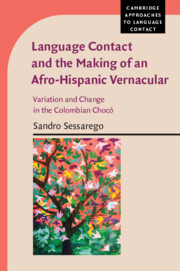Crossref Citations
This Book has been
cited by the following publications. This list is generated based on data provided by Crossref.
Sessarego, Sandro
2017.
Chocó Spanish and the Missing Spanish Creole debate.
Language Ecology,
Vol. 1,
Issue. 2,
p.
213.
Sessarego, Sandro
2020.
Hispanic Contact Linguistics.
Vol. 22,
Issue. ,
p.
44.
Díaz-Campos, Manuel
Escalona Torres, Juan M.
and
Filimonova, Valentyna
2020.
Sociolinguistics of the Spanish-Speaking World.
Annual Review of Linguistics,
Vol. 6,
Issue. 1,
p.
363.
Ortiz López, Luis A.
Guzzardo Tamargo, Rosa E.
and
González-Rivera, Melvin
2020.
Hispanic Contact Linguistics.
Vol. 22,
Issue. ,
p.
2.
Sessarego, Sandro
2020.
Not all grammatical features are robustly transmitted during the emergence of creoles.
Humanities and Social Sciences Communications,
Vol. 7,
Issue. 1,
Drinka, Bridget
and
Chappell, Whitney
2021.
Spanish Socio-Historical Linguistics.
Vol. 12,
Issue. ,
p.
2.
Sessarego, Sandro
2021.
Spanish Socio-Historical Linguistics.
Vol. 12,
Issue. ,
p.
164.
Korfhagen, David
Rao, Rajiv
and
Sessarego, Sandro
2021.
Aspects of Latin American Spanish Dialectology.
Vol. 32,
Issue. ,
p.
155.
Arias-Quintero, Irene
Jiménez-Baralt, Rafael
Visconte, Piero
and
Sessarego, Sandro
2023.
El español del Chocó: una lengua afro-hispánica en la frontera española.
Forma y Función,
Vol. 36,
Issue. 1,
Visconte, Piero
2024.
El español de Loíza en el Debate de los Criollos del Español: Un análisis sociohistórico y lingüístico.
International Journal of the Sociology of Language,
Vol. 2024,
Issue. 286,
p.
113.





